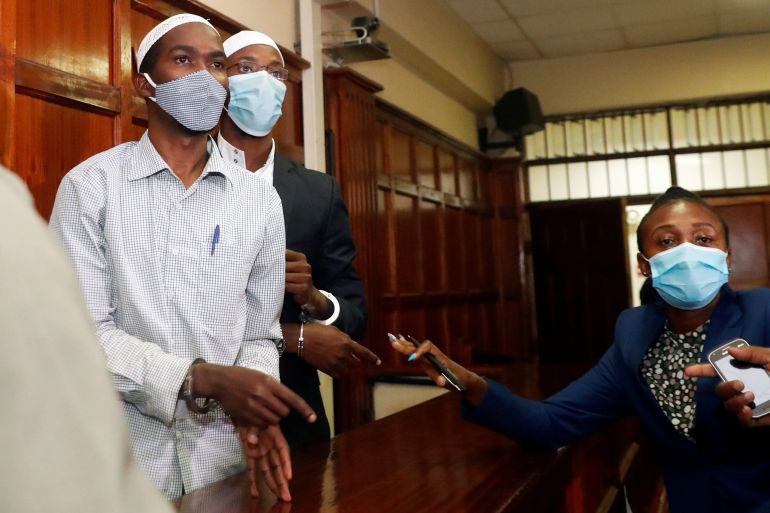Kenyan court jails men over 2013 Westgate mall attack
Mohamed Ahmed Abdi and Hassan Hussein Mustafa found guilty of supporting gunmen behind the attack in Nairobi that killed 67 people.

A court in Kenya sentenced two men to 18 years in prison for helping al-Shabab gunmen in a 2013 attack on Nairobi’s Westgate shopping mall that killed 67 people.
Mohamed Ahmed Abdi and Hussein Hassan Mustafa were sentenced to 18 years each for providing support to the assailants. Abdi was given an additional 15-year jail sentence for possession of materials promoting “terrorism”.
Keep reading
list of 4 itemsOn Westgate’s 7th anniversary, Kenya is repeating its mistakes
It is time to negotiate with al-Shabab
Somalia: Kenya’s foreign policy failure
“This court has to pass a sentence … commensurate with the offence,” Chief Magistrate Francis Andayi told the two on Friday as they stood in a Nairobi courtroom.
He said the seven years the men spent on remand would be deducted from their sentences.
The attack on the upscale mall, a favourite of Kenya’s growing middle class and foreign workers, happened two years after the East African nation sent troops into Somalia following a series of kidnappings and raids on Kenyan soil by the armed group al-Shabab.
Al-Shabab has promised retribution for Kenya for sending troops to fight the group in Somalia since 2011.
Although there was no specific evidence the convicted pair had provided material help, the court was satisfied their communication with the attackers amounted to supporting the armed rampage, and justified the guilty verdict for conspiracy.
A third defendant, Liban Abdullah Omar, was acquitted in the trial, which concluded on October 7. He was abducted by a group of gunmen a day after being released from custody and his whereabouts is still unknown.
Kenyan authorities’ disorganised response to the Westgate attack deeply damaged the country’s reputation.
Soldiers and police fired at each other during a chaotic four days and footage emerged of soldiers looting the complex as bodies lay sprawled on the bloodstained floors.
‘Peripheral responsibility’
Defence lawyer Mbugua Mureithi pleaded for leniency for his client, saying Abdi has accepted the court’s findings and was remorseful, though he maintains his innocence.
Mureithi urged a custodial sentence for Abdi, allowing him to report to a police station from time to time, because he was a first offender.
“His responsibility is peripheral other than the communication interlinks between him and the actual men who killed our people,” Mureithi said. “There is no evidence that he provided them with the logistics or finances or any other form of tangible support to execute our people.”
Abdi asked the court to consider his family situation as well: “My father is suffering from cancer and I’m the oldest,” he said.
Mustafah also asked for leniency, saying he needed to look after his elderly parents.